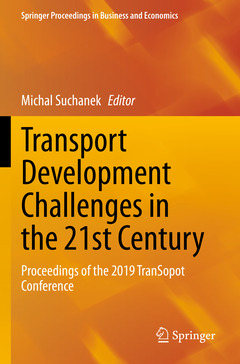Description
Transport Development Challenges in the 21st Century, 1st ed. 2021
Proceedings of the 2019 TranSopot Conference
Springer Proceedings in Business and Economics Series
Language: English
Subject for Transport Development Challenges in the 21st Century:
Transport Development Challenges in the 21st Century
Publication date: 04-2022
273 p. · 15.5x23.5 cm · Paperback
Publication date: 04-2022
273 p. · 15.5x23.5 cm · Paperback
Transport Development Challenges in the 21st Century
Publication date: 04-2021
273 p. · 15.5x23.5 cm · Hardback
Publication date: 04-2021
273 p. · 15.5x23.5 cm · Hardback
Description
/li>Contents
/li>Biography
/li>Comment
/li>
This proceedings present current trends in the transport growth. It presents transport solutions both at a micro-level, such as that of a single city or a single company, as well as at a macro-level of a whole transportation system. The transport decisions made by an individual in regards to the transport mode and route, add up to the structure and efficiency of the whole system. Transport systems cannot grow extensively anymore, due to lack of space or the amount of additional costs, so the authors presents new solutions, ones which are innovative and sustainable, while also increasing the efficiency of transport operations. These solutions are analyzed for performance at a scale of individual cities or companies, as well as whole transport systems. The researchers, who are often also practitioners in the field of transport, provide not only the theoretical background for the transport analysis but also empirical data and practical experience.
Chapter1. Shaping levels of city bus prices as a result of tenders.- Chapter 2. Changes in urban transport behaviour and preferences of residents in employment - Gdynia case.- Chapter 3. Convenience as a factor differentiating air transport service.- Chapter 4. Future of air cargo in Poland.- Chapter 5. Railway Special Grid in Near Field Communication Technology for rail transport infrastructure.- Chapter 6. The role of urban environmental sound in the orientation of people with impaired vision.- Chapter 7. Conditions of using a bi-directional tram in the sustainable urban transport system (case study based on the example of Szczecin, Poland).- Chapter 8.Technical, Economic and Organizational Constraints to Achieve a 100% Electric Bus Fleet in Urban Trans-it Company.- Chapter 9. Can the metropolitan rail system reduce the development of individual transport? (case study on the example of the Szczecin Metropolitan Railway project, Szczecin, Poland).- Chapter 10. Data integration models for transport execution systems.- Chapter 11. Modeling Demand for Transport Services.- Chapter 12. Analysis of Trends in Development of Electromobility in Poland - Current Problems and Issues.- Chapter 13. Wireless sensor networks for traffic monitoring.- Chapter 14. Changes in structure and spatial distribution of heavy goods vehicles traffic in Poland in 2005-2015, with particular emphasis on border traffic.- Chapter 15.Value creation for stakeholders in the implementation of "last mile" deliveries in cities.- Chapter 16.Challenges related to the implementation and development of electromobility in cities.- Chapter 17.Generalized cost of daily trips on the example of public transport and private car selection.- Chapter 18. The potential of road transport companies for the adaptation measures' implementation concerning climate change.
Michał Suchanek is an associate professor at the University of Gdańsk. His research specialization focuses on the problems of sustainable urban mobility, especially in the context of public health and quality of life. He is an Author and co-Author of over 50 publications including articles in JCR Journals. He is an Author of a research report for the European Parliament on the cost effectiveness of retrofitting smart tachographs in HDVs.
Focus on crucial aspects of financing through the operational programmes of the European Union
Latest research on transport innovation and sustainability
Examines analytical methods, including economic and econometric analysis
© 2024 LAVOISIER S.A.S.



